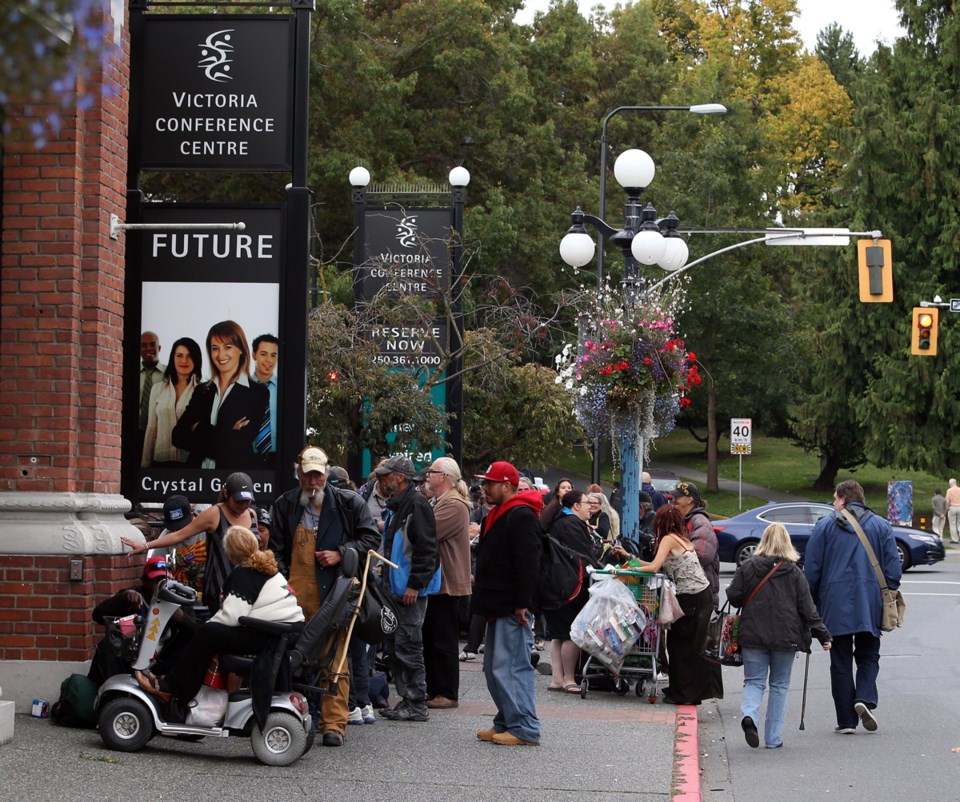We applaud the City of Victoria’s commitment to accessibility at their sheltering-solutions workshop last week, which included providing $20 stipends to participants currently experiencing homelessness.
We are alerted to the need to explain why stipends are a best practice for including people who live in extreme poverty by a Times Colonist editorial (“Paying for input a disturbing trend,” Sept. 19).
The editorial misunderstands barriers to participation by arguing that interest in the issue should be sufficient to bring people living in extreme poverty to public meetings. Accessibility measures for persons with disabilities (such as wheelchair ramps) are now accepted as common sense, but it’s helpful to remember that these measures did not come easily or quickly.
Much like stipends now, basic things such as wheelchair-accessible buses and buildings slowly came to be accepted because of concerted public education and policy advocacy. We’re hoping our current conversation can be part of this important process of continuing to expand accessibility measures here in Victoria.
Much like the disability-rights movement, struggling during the 1970s and 1980s for wheelchair accessibility on transit and in public buildings, stipends address the issue that people do not all share the same capacities to use public services. In either case, taking accessibility seriously means recognizing that barriers are created by structural factors.
In cases of disability, exclusion is built into the architecture of buildings and vehicles; in cases of poverty, exclusion is built into the economic framework that shapes how much freedom people have in allocating time in their days.
There’s a powerful myth that people living in extreme poverty (without regular work or housing) spend all day sitting around and doing as they please. In our experience, we see that people experiencing poverty have a rigid daily schedule to provide basic subsistence for themselves.
This includes considerations such as being at services at the right times for food servings and to get nightly shelter. It also includes basic subsistence-oriented economic activities such as binning (collecting recyclable bottles).
Because income-generation such as binning are all-day activities with a very modest return, taking several hours off can mean a significant setback on an income that is already rarely enough to provide for a person’s most basic daily needs. These personal costs and risks associated with taking time to attend a meeting are increased by the fact that many individuals are on foot, and may also have various physical barriers, adding to the transportation costs (in time or in money) needed to attend a meeting that is not within their immediate vicinity.
For these reasons, stipends are a broadly accepted method for, at the very least, ensuring people experiencing extreme poverty do not have to put themselves at heightened risk of not meeting basic subsistence needs through the day in order to be socially and politically engaged (by attending public meetings, etc.).
The amount of a stipend will vary depending on available financial resources, but $10 per hour away from essential economic activities is standard practice in Victoria.
No doubt it’s possible to provide smaller stipends than this, but we believe a commitment to accessibility means more than simply providing people with the barest possible supports. The City of Victoria showed a great deal of respect for all residents of our city by being faithful to, and thoughtful about, this commitment.
It’s heartening to see the mayor and council continuing to move the city forward in terms of our respect for all residents, in the spirit of non-discrimination and inclusion that pushed the disability-rights movement forward so many years ago.
Mark Willson is health education co-ordinator for the Society of Living Illicit Drug Users. Sarah Wilson is a support and advocacy worker for the Victoria Persons With HIV/AIDS Society.



